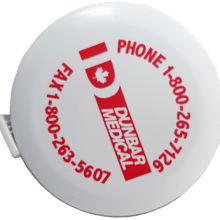Measuring Tape
Login For Health Care Pricing
In Stock
Pocket size, 56″ in length. Displays both inches and centimeters.
Measuring tapes are simple yet invaluable tools in sports medicine that allow healthcare professionals to obtain accurate measurements for a variety of purposes.
Whether assessing body dimensions, tracking progress, or measuring joint range of motion (ROM), measuring tapes play a critical role in providing precise data for effective performance evaluation and rehabilitation.
In this article, we explore the various ways measuring tapes are used in sports medicine and their importance in assessing athletes’ physical attributes and progress.
Measuring tapes are commonly used in sports medicine to obtain accurate body measurements and perform anthropometric assessments. These measurements help assess an athlete’s body composition, such as height, weight, girths (e.g., waist, hip, thigh), and skinfold thickness.
Body measurements are essential for monitoring changes in body composition over time, assessing growth patterns in young athletes, and evaluating physical changes during weight management programs. Accurate anthropometric data aids in setting realistic goals, designing individualized training programs, and optimizing performance outcomes.
Measuring tapes are valuable tools for assessing joint ROM in sports medicine. They are used to measure the distance between specific anatomical landmarks to determine the degree of joint movement.
For example, in assessing knee flexion or shoulder abduction, measuring tapes can be placed along the limb to measure the angle achieved during a specific movement. These measurements provide quantitative data on joint mobility, identify limitations or asymmetries, and assist in tracking progress during rehabilitation.
Monitoring joint ROM helps guide treatment protocols, track improvements, and inform return-to-play decisions.
Measuring tapes are used to assess flexibility and muscle length in sports medicine. They provide a means of measuring the distance an athlete can reach during specific stretches or flexibility tests. For example, the sit-and-reach test measures hamstring and lower back flexibility.
By recording the distance reached on a measuring tape, healthcare professionals can assess an athlete’s flexibility, identify limitations, and track changes over time. These measurements guide the development of flexibility programs, enable comparisons to normative data, and help prevent injuries related to insufficient flexibility.
Measuring tapes play a vital role in tracking an athlete’s progress and setting goals in sports medicine.
By consistently measuring and recording specific body dimensions or joint ROM, healthcare professionals can assess the effectiveness of training or rehabilitation programs. Measuring tapes allow for objective comparisons between baseline measurements and subsequent evaluations, enabling healthcare professionals to monitor changes and adjust interventions as necessary.
Tracking progress motivates athletes, provides evidence of improvement, and facilitates data-driven decision-making in performance enhancement and injury rehabilitation.
Measuring tapes are essential for proper equipment fitting and sizing in sports medicine. Athletes often require equipment such as braces, compression garments, or orthotics, which need to be fitted accurately for optimal performance and injury prevention. Measuring tapes help determine the appropriate size and fit of equipment by measuring specific body dimensions or joint circumferences. This ensures a proper and comfortable fit, promotes functionality, and reduces the risk of discomfort or injury due to ill-fitting equipment.
Measuring tapes are indispensable tools in sports medicine, providing accurate measurements for body dimensions, joint ROM, flexibility, progress tracking, and equipment fitting. These tools assist healthcare professionals in assessing an athlete’s physical attributes, tracking progress, and making informed decisions regarding treatment, training, and equipment selection.
By utilizing measuring tapes, healthcare professionals can obtain objective data, set goals, and tailor interventions to optimize performance and facilitate effective rehabilitation. The use of measuring tapes enhances precision, promotes evidence-based practice, and contributes to the overall success of athletes in sports medicine.

Login For Health Care Pricing
In Stock
Pocket size, 56″ in length. Displays both inches and centimeters.